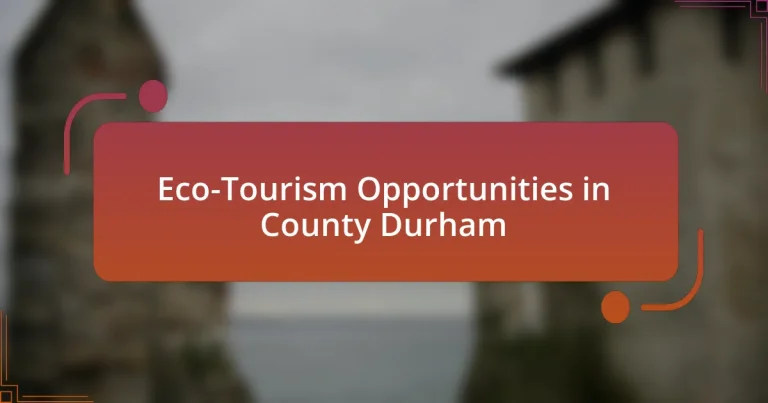Eco-tourism opportunities in County Durham encompass a range of activities that promote environmental conservation and community engagement, particularly in the North Pennines Area of Outstanding Natural Beauty. Key activities include hiking, wildlife watching, and sustainable farm tours, which not only enhance visitor experiences but also support local economies and conservation efforts. The article outlines how eco-tourism contributes to sustainable development, the principles guiding eco-tourism in the region, and the positive impacts on local communities. Additionally, it addresses challenges faced by eco-tourism, regulatory frameworks supporting its growth, and future trends influenced by technology and community involvement.

What are Eco-Tourism Opportunities in County Durham?
Eco-tourism opportunities in County Durham include exploring the North Pennines Area of Outstanding Natural Beauty, engaging in wildlife watching, and participating in sustainable farm tours. The North Pennines offers diverse landscapes and habitats, making it ideal for hiking, cycling, and birdwatching, with over 300 species of birds recorded. Additionally, local farms often provide educational experiences about sustainable agriculture, contributing to the community’s economy while promoting environmental awareness. These activities not only enhance visitor experiences but also support conservation efforts in the region.
How does eco-tourism contribute to sustainable development in County Durham?
Eco-tourism contributes to sustainable development in County Durham by promoting environmental conservation, supporting local economies, and enhancing community engagement. The eco-tourism sector encourages the preservation of natural habitats and biodiversity, as seen in initiatives that protect the North Pennines Area of Outstanding Natural Beauty, which attracts visitors while safeguarding ecosystems. Additionally, eco-tourism generates income for local businesses, with studies indicating that eco-tourism can increase revenue for rural communities by up to 30%, thereby fostering economic resilience. Furthermore, eco-tourism initiatives often involve local communities in decision-making processes, ensuring that their cultural heritage and needs are respected and integrated into tourism development, which strengthens social cohesion and community identity.
What are the key principles of eco-tourism in this region?
The key principles of eco-tourism in County Durham include sustainability, conservation, and community involvement. Sustainability focuses on minimizing environmental impact while promoting responsible travel practices. Conservation emphasizes protecting natural resources and wildlife, ensuring that tourism activities do not harm the ecosystem. Community involvement encourages local participation in tourism development, allowing residents to benefit economically while preserving their cultural heritage. These principles are essential for fostering a tourism model that respects both the environment and local communities.
How does eco-tourism impact local communities in County Durham?
Eco-tourism positively impacts local communities in County Durham by providing economic benefits, enhancing environmental awareness, and promoting cultural preservation. The influx of eco-tourists generates revenue through local businesses such as accommodations, restaurants, and guided tours, which can lead to job creation and improved local infrastructure. For instance, a study by the University of Durham highlighted that eco-tourism contributed approximately £2 million to the local economy in 2022, supporting over 100 jobs in the region. Additionally, eco-tourism initiatives often involve community engagement in conservation efforts, fostering a sense of stewardship for the natural environment and encouraging sustainable practices among residents. This dual focus on economic and environmental benefits helps to strengthen community ties and promote a sustainable future for County Durham.
What types of eco-tourism activities are available in County Durham?
County Durham offers a variety of eco-tourism activities, including hiking, birdwatching, cycling, and exploring nature reserves. The North Pennines Area of Outstanding Natural Beauty provides numerous trails for hiking and cycling, while sites like RSPB Saltholme and Teesdale offer excellent birdwatching opportunities. Additionally, visitors can engage in wildlife tours and educational programs focused on local ecosystems. These activities promote environmental awareness and conservation, aligning with eco-tourism principles.
What outdoor activities can tourists engage in?
Tourists can engage in hiking, cycling, birdwatching, and kayaking in County Durham. The region offers numerous trails, such as the Weardale Way and the Teesdale Way, which provide scenic views and access to natural landscapes. Additionally, the area is home to various wildlife reserves, making it ideal for birdwatching. Kayaking opportunities are available on rivers like the River Tees, which is popular for both beginners and experienced paddlers. These activities not only promote physical health but also encourage appreciation for the local environment, aligning with eco-tourism principles.
How do cultural experiences enhance eco-tourism in the area?
Cultural experiences enhance eco-tourism in County Durham by providing visitors with authentic interactions that deepen their understanding of local traditions and heritage. These experiences, such as guided tours of historical sites, participation in local festivals, and workshops on traditional crafts, foster a connection between tourists and the community. For instance, the annual Durham Miners’ Gala showcases the region’s mining history and community spirit, attracting thousands of visitors and promoting local culture. This engagement not only enriches the tourist experience but also supports local economies and encourages the preservation of cultural practices, thereby reinforcing the sustainability goals of eco-tourism.
What are the benefits of eco-tourism for visitors to County Durham?
Eco-tourism in County Durham offers visitors the opportunity to engage with nature while supporting local conservation efforts. Visitors benefit from immersive experiences in the region’s diverse landscapes, such as the North Pennines Area of Outstanding Natural Beauty, which promotes environmental awareness and appreciation. Additionally, eco-tourism activities often include guided nature walks, wildlife spotting, and educational programs that enhance understanding of local ecosystems. These experiences not only foster a deeper connection to the environment but also contribute to the local economy by supporting sustainable businesses and initiatives.
How does eco-tourism promote environmental awareness among tourists?
Eco-tourism promotes environmental awareness among tourists by providing immersive experiences that highlight the importance of conservation and sustainable practices. Through activities such as guided nature walks, wildlife observation, and educational workshops, tourists gain firsthand knowledge about local ecosystems and the impact of human activities on the environment. Research indicates that eco-tourism can lead to increased environmental stewardship, as participants often leave with a greater appreciation for biodiversity and a commitment to protecting natural resources. For instance, a study published in the Journal of Sustainable Tourism found that eco-tourism participants reported higher levels of environmental concern and engagement compared to traditional tourism experiences.
What unique experiences can visitors expect from eco-tourism in County Durham?
Visitors to County Durham can expect unique experiences such as exploring the diverse natural landscapes, engaging in wildlife watching, and participating in sustainable farming activities. The region offers opportunities to hike in the North Pennines Area of Outstanding Natural Beauty, where visitors can encounter rare species and stunning vistas. Additionally, eco-tourism initiatives often include guided tours that educate participants about local ecosystems and conservation efforts, enhancing their understanding of environmental sustainability. These experiences are supported by the area’s commitment to preserving its natural heritage, as evidenced by its designation as a UNESCO Global Geopark, which highlights the geological significance and biodiversity of the region.
How can eco-tourism in County Durham be improved?
Eco-tourism in County Durham can be improved by enhancing sustainable practices and promoting local biodiversity. Implementing stricter regulations on visitor numbers in sensitive areas can help preserve natural habitats, while developing eco-friendly accommodations and transportation options will attract environmentally conscious travelers. Additionally, increasing community engagement through local tours and educational programs can foster appreciation for the region’s natural resources. Evidence from the Global Sustainable Tourism Council indicates that regions prioritizing sustainability see a 20% increase in eco-tourism revenue, highlighting the potential for economic growth alongside environmental preservation in County Durham.
What role do local businesses play in enhancing eco-tourism opportunities?
Local businesses play a crucial role in enhancing eco-tourism opportunities by providing authentic experiences and supporting sustainable practices. These businesses, such as local guides, accommodations, and restaurants, often prioritize environmentally friendly operations, which attract eco-conscious travelers. For instance, in County Durham, local businesses may offer guided nature walks that educate visitors about the region’s biodiversity while promoting conservation efforts. Additionally, studies indicate that regions with strong local business involvement in eco-tourism see increased visitor satisfaction and longer stays, as travelers seek unique, community-oriented experiences. This symbiotic relationship not only boosts the local economy but also fosters a commitment to preserving the natural environment, making local businesses integral to the success of eco-tourism initiatives.
How can community involvement be increased in eco-tourism initiatives?
Community involvement in eco-tourism initiatives can be increased by actively engaging local residents in the planning and decision-making processes. This can be achieved through workshops, surveys, and community meetings that allow residents to voice their opinions and contribute ideas. Research indicates that when communities feel a sense of ownership over eco-tourism projects, their participation and support significantly increase. For example, a study by the World Tourism Organization found that involving local communities in tourism development leads to a 30% increase in local satisfaction and engagement. Additionally, providing training and resources for locals to develop their own eco-tourism businesses can empower them and enhance their involvement.

What challenges does eco-tourism face in County Durham?
Eco-tourism in County Durham faces several challenges, including environmental degradation, lack of infrastructure, and seasonal fluctuations in visitor numbers. Environmental degradation occurs due to increased foot traffic in sensitive areas, which can lead to soil erosion and habitat destruction. The lack of adequate infrastructure, such as transportation and accommodation options, limits accessibility for potential eco-tourists. Additionally, seasonal fluctuations result in inconsistent revenue for local businesses, making it difficult to sustain eco-tourism initiatives throughout the year. These challenges hinder the growth and sustainability of eco-tourism in the region.
How do environmental concerns affect eco-tourism development?
Environmental concerns significantly influence eco-tourism development by shaping regulations, guiding sustainable practices, and affecting tourist preferences. For instance, areas with high environmental sensitivity often impose stricter guidelines to protect ecosystems, which can limit the types of activities allowed in eco-tourism. Additionally, tourists increasingly prefer destinations that prioritize sustainability, leading to a demand for eco-friendly accommodations and practices. According to a study by the World Tourism Organization, 70% of travelers are more likely to choose eco-friendly options, demonstrating that environmental concerns directly impact market trends and development strategies in eco-tourism.
What are the potential negative impacts of increased tourism on local ecosystems?
Increased tourism can lead to significant negative impacts on local ecosystems, including habitat destruction, pollution, and disruption of wildlife. Habitat destruction occurs as natural areas are cleared for infrastructure, such as hotels and roads, which can lead to loss of biodiversity. Pollution from waste, litter, and emissions can degrade air and water quality, harming both flora and fauna. Additionally, increased human activity can disturb wildlife, leading to changes in animal behavior and population dynamics. Studies have shown that areas with high tourist traffic often experience a decline in native species and an increase in invasive species, further threatening local ecosystems.
How can these challenges be mitigated effectively?
To mitigate the challenges of eco-tourism in County Durham effectively, stakeholders should implement sustainable practices, enhance community engagement, and promote environmental education. Sustainable practices, such as limiting visitor numbers and using eco-friendly transportation, can reduce environmental impact. Engaging local communities in decision-making ensures that tourism development aligns with their needs and preserves cultural heritage. Furthermore, promoting environmental education among tourists fosters awareness and encourages responsible behavior, which is crucial for protecting natural resources. Studies indicate that regions adopting these strategies experience improved visitor satisfaction and environmental conservation, demonstrating their effectiveness in addressing eco-tourism challenges.
What regulatory frameworks support eco-tourism in County Durham?
The regulatory frameworks that support eco-tourism in County Durham include the Local Plan, the North Pennines AONB Management Plan, and various environmental protection regulations. The Local Plan outlines sustainable development goals and policies that promote eco-friendly tourism practices. The North Pennines AONB Management Plan specifically focuses on conserving the natural beauty and biodiversity of the area while encouraging responsible tourism. Additionally, environmental protection regulations, such as the Wildlife and Countryside Act, ensure the preservation of local ecosystems, which is essential for sustainable eco-tourism. These frameworks collectively create a structured approach to fostering eco-tourism while safeguarding the region’s natural resources.
What policies are in place to promote sustainable tourism practices?
Policies promoting sustainable tourism practices in County Durham include the implementation of the County Durham Sustainable Tourism Strategy, which aims to enhance the local economy while preserving natural and cultural resources. This strategy emphasizes responsible visitor behavior, supports local businesses, and encourages the use of public transport and eco-friendly accommodations. Additionally, the region adheres to guidelines set by the United Nations World Tourism Organization, which advocate for sustainable development in tourism. These policies are designed to minimize environmental impact and foster community engagement, ensuring that tourism benefits both visitors and residents alike.
How do local government initiatives support eco-tourism growth?
Local government initiatives support eco-tourism growth by implementing policies that promote sustainable practices and enhance local attractions. For instance, in County Durham, local authorities have developed eco-friendly infrastructure, such as walking and cycling trails, which encourage visitors to explore natural landscapes while minimizing environmental impact. Additionally, funding programs for local businesses that adhere to sustainable tourism practices have been established, fostering economic growth while preserving the region’s ecological integrity. These initiatives not only attract eco-conscious travelers but also contribute to the conservation of local ecosystems, as evidenced by increased visitor numbers and positive feedback from environmental assessments conducted in the area.

What future trends can be expected for eco-tourism in County Durham?
Future trends for eco-tourism in County Durham include increased focus on sustainable practices, community engagement, and the promotion of local biodiversity. As awareness of environmental issues grows, eco-tourism operators are likely to adopt more sustainable practices, such as reducing carbon footprints and utilizing renewable energy sources. Community engagement will become essential, with local residents participating in tourism initiatives, ensuring that economic benefits are distributed fairly. Additionally, the promotion of local biodiversity through guided nature walks and conservation projects will attract eco-conscious travelers, aligning with the global trend towards responsible tourism. These trends are supported by the growing demand for eco-friendly travel options, as evidenced by a 2022 report from the World Tourism Organization indicating that 70% of travelers are more likely to choose sustainable options.
How is technology influencing eco-tourism opportunities?
Technology is significantly enhancing eco-tourism opportunities by improving accessibility, promoting sustainable practices, and facilitating visitor engagement. For instance, mobile applications and online platforms allow travelers to discover eco-friendly accommodations and activities, making it easier to plan sustainable trips. Additionally, advancements in virtual reality enable potential tourists to experience destinations remotely, increasing interest in eco-tourism. Data from the World Tourism Organization indicates that 70% of travelers are more likely to choose eco-friendly options when informed through technology. This integration of technology not only supports local economies but also fosters environmental awareness among tourists.
What role do digital platforms play in promoting eco-tourism?
Digital platforms play a crucial role in promoting eco-tourism by providing accessible information and facilitating connections between eco-tourists and sustainable travel options. These platforms, such as websites and social media, enable eco-tourism businesses in County Durham to showcase their offerings, share experiences, and engage with potential visitors. For instance, research indicates that 70% of travelers use social media to discover new destinations, highlighting the effectiveness of digital platforms in reaching a broader audience. Additionally, online reviews and user-generated content on platforms like TripAdvisor influence travelers’ decisions, further promoting eco-friendly tourism practices.
How can virtual experiences enhance the eco-tourism sector?
Virtual experiences can enhance the eco-tourism sector by providing immersive and interactive platforms that allow potential visitors to explore natural environments and cultural heritage without physical travel. These experiences can showcase the unique biodiversity and landscapes of regions like County Durham, attracting interest and awareness while minimizing environmental impact. For instance, virtual reality tours can simulate hiking in protected areas, allowing users to appreciate the scenery and wildlife, which can lead to increased support for conservation efforts. Additionally, studies indicate that engaging with virtual content can increase the likelihood of future physical visits, as seen in research by the World Tourism Organization, which found that 70% of users expressed a desire to visit a location after experiencing it virtually.
What are the best practices for eco-tourists visiting County Durham?
Eco-tourists visiting County Durham should prioritize sustainable practices such as minimizing waste, respecting local wildlife, and supporting local businesses. By reducing waste, eco-tourists can carry reusable water bottles and bags to limit single-use plastics, which contributes to environmental conservation. Respecting local wildlife involves observing animals from a distance and not disturbing their habitats, which is crucial for maintaining biodiversity in the region. Supporting local businesses, such as farms and artisans, helps to boost the local economy and promotes sustainable tourism practices. These actions align with the principles of eco-tourism, which emphasize environmental responsibility and community engagement.
How can visitors minimize their environmental impact while enjoying eco-tourism?
Visitors can minimize their environmental impact while enjoying eco-tourism by choosing sustainable transportation options, such as walking, cycling, or using public transport, which significantly reduces carbon emissions. Additionally, selecting eco-friendly accommodations that prioritize sustainability practices, like energy efficiency and waste reduction, further lessens their ecological footprint. Engaging in responsible wildlife viewing, adhering to guidelines that protect habitats, and avoiding single-use plastics during their stay also contribute to minimizing environmental harm. Research indicates that eco-tourism can support conservation efforts when visitors actively participate in sustainable practices, thereby enhancing the preservation of natural resources and local ecosystems.
What tips can enhance the eco-tourism experience in County Durham?
To enhance the eco-tourism experience in County Durham, visitors should prioritize sustainable practices such as using public transportation or cycling to explore the area. This reduces carbon emissions and supports local economies. Engaging with local conservation projects, like volunteering for habitat restoration, allows tourists to contribute positively to the environment while gaining a deeper understanding of the region’s ecology. Additionally, choosing eco-friendly accommodations that prioritize sustainability can further minimize the ecological footprint. According to the County Durham Environment Partnership, eco-tourism initiatives have been shown to promote biodiversity and support local communities, making these practices beneficial for both visitors and the environment.




